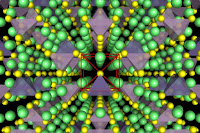New research paves the way for rechargeable batteries with almost indefinite lifetimes, researchers say.
Now researchers at MIT and Samsung, and in California and Maryland, have developed a new approach to one of the three basic components of batteries, the electrolyte. The new findings are based on the idea that a solid electrolyte, rather than the liquid used in today’s most common rechargeables, could greatly improve both device lifetime and safety — while providing a significant boost in the amount of power stored in a given space.
The results are reported in the journal Nature Materials in a paper by MIT postdoc Yan Wang, visiting professor of materials science and engineering Gerbrand Ceder, and five others. They describe a new approach to the development of solid-state electrolytes that could simultaneously address the greatest challenges associated with improving lithium-ion batteries, the technology now used in everything from cellphones to electric cars.
The electrolyte in such batteries — typically a liquid organic solvent whose function is to transport charged particles from one of a battery’s two electrodes to the other during charging and discharging — has been responsible for the overheating and fires that, for example, resulted in a temporary grounding of all of Boeing’s 787 Dreamliner jets, Ceder explains. Others have attempted to find a solid replacement for the liquid electrolyte, but this group is the first to show that this can be done in a formulation that fully meets the needs of battery applications.
Solid-state electrolytes could be “a real game-changer,” Ceder says, creating “almost a perfect battery, solving most of the remaining issues” in battery lifetime, safety, and cost.
Costs have already been coming down steadily, he says. But as for safety, replacing the electrolyte would be the key, Ceder adds: “All of the fires you’ve seen, with Boeing, Tesla, and others, they are all electrolyte fires. The lithium itself is not flammable in the state it’s in in these batteries. [With a solid electrolyte] there’s no safety problem — you could throw it against the wall, drive a nail through it — there’s nothing there to burn.”
The proposed solid electrolyte also holds other advantages, he says: “With a solid-state electrolyte, there’s virtually no degradation reactions left” — meaning such batteries could last through “hundreds of thousands of cycles.”
Read more at Going Solid-State Could Make Batteries Safer and Longer-Lasting

No comments:
Post a Comment